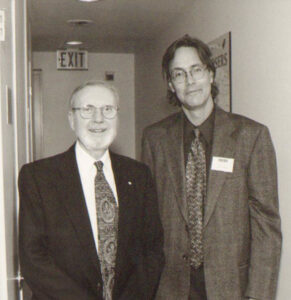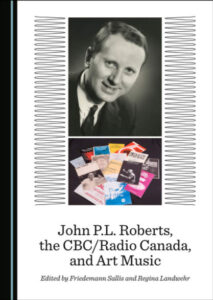John P.L. Roberts turns 90

The administrator, broadcasting executive, and cultural policy adviser John Peter Lee Roberts was born on October 21st, 1930 in Sydney, Australia. After studying music in Australia and London, he immigrated to Canada in 1955, becoming a music producer at CBC Winnipeg. Two years later he moved to CBC Toronto, rising over the years to a series of successively more senior and influential positions and inaugurating a wide variety of programs and policies that defined serious music at the CBC for over two decades. He invited major composers to CBC Toronto, including Igor Stravinsky, Michael Tippett, and Pierre Boulez. Roberts was also a firm proponent of Canadian music; during the period between 1965 and 1975, he was responsible for overseeing about 150 CBC commissions from Canadian composers. In his autobiography My Life on Earth and Elsewhere (2012), R. Murray Schafer noted “I was grateful to John for his faith in my work. He was certainly the most daring and dedicated music director the CBC ever had. John put much more money into commissioning composers than any director before or since him and he was open to experiments” (97–99).
After leaving the CBC, Roberts enjoyed a second career as a university administrator, becoming Dean of the Faculty of Fine Arts at the University of Calgary in 1987 and serving in that capacity until 1995. During the 1995–96 academic year, he was the first Seagram Visiting Fellow in the McGill Institute for the Study of Canada at McGill University. As an indefatigable organizer and animateur, Roberts was an active member of dozens of music, arts, and cultural policy boards, organizations, and committees. He served as President of the Canadian Music Council, the International Music Council, the Canadian Music Centre, Les Jeunesses musicales du Canada, and the Canadian Association of Fine Arts Deans, and as the Founding President of The Glenn Gould Foundation, where he established the Glenn Gould Prize (R. Murray Schafer was the first recipient of the prize; the most recent winner, announced earlier this month, is the Abenaki filmmaker and musician Alanis Obomsawin).

Among the many honours which Roberts has received are honorary doctoral degrees from the University of Victoria (1992) and the University of Manitoba (1997), and investiture as a Member of the Order of Canada in 1982 (promoted to Officer in 1996). Roberts donated his personal papers to the University of Calgary in 2014, where they form the John P.L. Roberts fonds. In celebration of this donation, a two-day symposium titled ‘John Roberts, the CBC and Music in Canada’ was held at the University of Calgary 1–2 October 2015. The symposium in turn led to the book John P.L. Roberts, the CBC/Radio Canada, and Art Music edited by Friedemann Sallis and Regina Landwehr, which is due to be published soon by Cambridge Scholars Publishing. The book includes chapters by the two editors, as well as by Robert Bailey, Josée Beaudet, Norma Beecroft, Brian Cherney, Ariane Couture, James Deaville with Keely Mimnagh, Robin Elliott, Kimberly Francis, Allan Morris, Paul Sanden, Jeremy Strachan, and Richard Sutherland, and also an interview with Roberts by Brian Garbet. It is a fitting tribute to Roberts on the occasion of his 90th birthday.